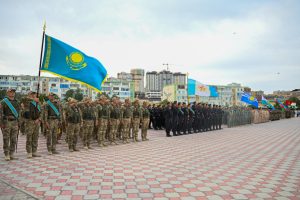Against the backdrop of border conflicts between countries in the region, Russian aggression against Ukraine, and rising global tensions, Central Asian countries are increasingly aware of the need to pursue their own solutions in the security sector. So far in 2024, Kazakhstan has hosted two important events that underscore growing security cooperation in the region.
First, on May 16, a meeting of the secretaries of the security councils of the five Central Asian countries was held in Astana. It was the first meeting of its kind in the region. Kazakhstan, as the soon-to-be host of the Sixth Consultative Meeting of Central Asian Heads of State, scheduled for August 9, proposed complementing that endeavor with a dialogue on security and cooperation in Central Asia at the level of security council secretaries.
The security chefs’ dialogue represents a new chapter in contemporary Central Asian regionalism. It reflects a growing recognition among the five nations that their shared challenges require shared solutions. Paramount among these challenges are the delimitation and strengthening of regional borders.
The arms race between Kyrgyzstan and Tajikistan, following a large-scale border conflict in September 2022, has raised serious concerns regionally, most notably in Uzbekistan and Kazakhstan. Russia, Turkey, Iran, and China have all been involved in the supply of military equipment to Central Asia broadly, and Kyrgyzstan and Tajikistan in particular. Some of these countries are seeking also to become security brokers.
The increased intensity of the border conflict shocked the governments of Kyrgyzstan and Tajikistan, but paradoxically, rather than worsening relations, the flash of violence ultimately had an opposite, positive effect. Both countries have earnestly begun to deepen and intensify their security dialogue and cooperation. On July 30, officials from Kyrgyzstan and Tajikistan claimed that following months of negotiation they had agreed on 94 percent of their 972-kilometer border.
It is no coincidence that at the meeting with the secretaries of the security councils, Kazakhstani President Kassym-Jomart Tokayev called for coordinated resistance against external powers attempting to incite conflict and split the region’s nations apart.
Second, on July 9-17, Kazakhstan hosted Birlestik-2024 (Alliance-2024) exercises. The large-scale military exercise was the first held in Central Asia without the participation of Russia or China. About 4,000 military personnel and 700 units of weapons and military equipment from Kazakhstan, Kyrgyzstan, Tajikistan, Uzbekistan, and Azerbaijan were involved in the exercises. The practical goals of the exercises are indicative of regional priorities – conducting operations to ensure maritime security and protect infrastructure, training of joint ground and air reconnaissance groups, naval special forces, army and front-line aviation crews, warships, boats, artillery crews, and assault and tank units.
The location was no coincidence either – Birlestik-2024 took place in the Caspian Sea region. All five countries are part of the “Middle Corridor” transport route through the Caspian Sea connecting the region with Europe by bypassing Russia. Joint military exercises show that the Central Asian countries and Azerbaijan are seeking to resolve security issues in the region on their own.
These initiatives could have important long-term implications for strengthening regional security integration – unless a neighboring power again tries to interfere in the process.
This has happened before. In independence, large-scale agreements were concluded among the Central Asian states, which led to the creation of integration organizations and structures in Central Asia, including the Central Asian Cooperation Organization (CACO) and the Council of Defense Ministers. However, the downside of this process was that these steps faced competition from powerful neighbors. Russia focused on promoting the Collective Security Treaty Organization (CSTO) under its control, while China concentrated on developing the Shanghai Cooperation Organization (SCO). Finally, in 2004, Russia joined CACO. As a result, a year later, in 2005, at the CACO summit in St. Petersburg, the organization disappeared, merging with a new Russian project, the Eurasian Economic Community.
Perhaps this history is why, almost two decades, some Central Asian states are still cautious about the institutionalization of regional integration efforts.
The creation of a regional organization may once again raise unfounded suspicions in the Kremlin and prompt efforts at involvement or interference. However, the pressing problems in the region, such as border and territorial disputes, transport corridor security, and risks of extremism and terrorism, require urgent solutions that regional states are best equipped to pioneer. It is therefore important for countries in the Central Asian region to focus on building functional institutions of cooperation even if, for the time being, they continue to avoid institutionalization.
Astana intends to seize the present window of opportunity to launch a new cycle of regional cooperation by proposing a detailed “Central Asia – 2040” strategy at the Sixth Consultative Meeting of Central Asian Countries on August 9, 2024.
Kazakhstan seeks to build a network of bilateral and multilateral agreements with the regional states of Central Asia to consolidate and deepen relations. All these steps could lead to the strengthening of Central Asia’s international subjectivity.
In July 2022, the five Central Asian presidents considered a “Treaty of Friendship, Good Neighborliness and Cooperation for the Development of Central Asia in the 21st Century” at their summit in Kyrgyzstan, but Tajikistan and Turkmenistan refrained from signing on.
Kazakhstan hopes at the upcoming meeting is to persuade the two to join the friendship treaty so that it can enter into force. Such a treaty would indeed be a political platform for future unification.

































